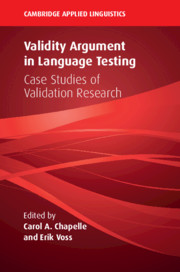Book contents
- Validity Argument in Language Testing
- The Cambridge Applied Linguistics Series
- Validity Argument in Language Testing
- Copyright page
- Contents
- Figures
- Tables
- Contributors
- Series Editor’s Preface
- 1 Introduction to Validity Argument in Language Testing and Assessment
- Part I Basic Concepts and Uses of Validity Argument in Language Testing and Assessment
- Part II Investigating Score Interpretations
- 4 Domain Definition Inference for a Virtual Interactive Aviation English Test (VIAET) for Military Air Traffic Controllers
- 5 Support for the Evaluation Inference
- 6 Generalization Inference for a Computer-Mediated Graphic-Prompt Writing Test for ESL Placement
- 7 The Telephone Standard Speaking Test
- 8 The Explanation Inference for a Test of Academic English Collocational Ability
- 9 Extrapolation of the Meaning of Grades on Writing Tasks in an ESL Writing Class to Success on Tasks in University Courses
- Part III Investigating Score Uses and Consequences
- Part IV Conclusion
- Index
- References
7 - The Telephone Standard Speaking Test
An Outside Evaluator’s Investigation of a Rebuttal to the Generalization Inference
from Part II - Investigating Score Interpretations
Published online by Cambridge University Press: 14 January 2021
- Validity Argument in Language Testing
- The Cambridge Applied Linguistics Series
- Validity Argument in Language Testing
- Copyright page
- Contents
- Figures
- Tables
- Contributors
- Series Editor’s Preface
- 1 Introduction to Validity Argument in Language Testing and Assessment
- Part I Basic Concepts and Uses of Validity Argument in Language Testing and Assessment
- Part II Investigating Score Interpretations
- 4 Domain Definition Inference for a Virtual Interactive Aviation English Test (VIAET) for Military Air Traffic Controllers
- 5 Support for the Evaluation Inference
- 6 Generalization Inference for a Computer-Mediated Graphic-Prompt Writing Test for ESL Placement
- 7 The Telephone Standard Speaking Test
- 8 The Explanation Inference for a Test of Academic English Collocational Ability
- 9 Extrapolation of the Meaning of Grades on Writing Tasks in an ESL Writing Class to Success on Tasks in University Courses
- Part III Investigating Score Uses and Consequences
- Part IV Conclusion
- Index
- References
Summary
The argument-based validation research reported in this chapter was conducted from the perspective of an outside evaluator with concerns about the consistency of scores on the Telephone Standard Speaking Test (TSST), a telephone-based test of second language (L2) English speaking proficiency used to assess improvement in speaking proficiency over time. The test use requires that the warrant for generalization be plausible. It states that observed scores are estimates of expected scores, which are consistent across test tasks, forms, occasions, and raters. To guide the investigation a rebuttal, that observed scores fail to estimate expected scores due to error introduced in the testing process, was formulated. The research investigated two of its assumptions. Data of the TSST scores from 55 undergraduates at two Japanese universities collected twice within a month indicated that test forms had the same means and the same SDs, and that the two scores of each participant were highly correlated. One-third of scores for the same individual differed by one score level. Thus, the results found partial support for one of the assumptions underlying the rebuttal. This chapter concludes by highlighting the important role of rebuttals for including threats of concern to test users in an interpretation/use argument.
- Type
- Chapter
- Information
- Validity Argument in Language TestingCase Studies of Validation Research, pp. 154 - 175Publisher: Cambridge University PressPrint publication year: 2021
References
- 1
- Cited by

